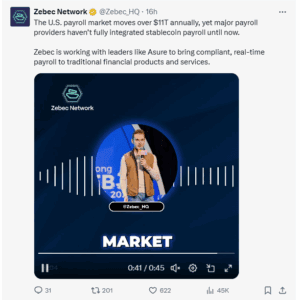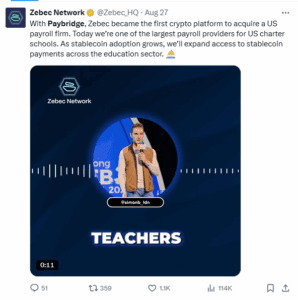The U.S. payroll market processes over $11 trillion annually, yet most major providers still rely on legacy systems that pay employees every two or four weeks. In a world where financial transactions clear in seconds, this delay stands out as a clear inefficiency. Zebec Network (ZBCN), a blockchain-based payments infrastructure, is challenging this convention.
It proposes a system where salaries can be streamed in real-time using stablecoins such as USDC — a digital dollar designed to maintain a 1:1 value with fiat currency. The question now is whether this model can genuinely disrupt one of the largest financial systems in existence.

Real-Time Streaming Replaces Conventional Payroll Cycles
Zebec’s solution replaces traditional payroll cycles with streaming payments, allowing money to flow continuously rather than in scheduled batches. Employees could receive wages every second, directly into digital wallets, rather than waiting weeks for payday.
Built initially on the Solana blockchain, Zebec enables employers to automate stablecoin payments across borders while maintaining compliance with tax and reporting regulations. The platform integrates Know Your Customer (KYC) and Anti-Money Laundering (AML) measures to ensure it aligns with existing financial standards.
You May Also Like: Does Zebec Network (ZBCN) Crypto Have the Potential to Grow?
Zebec’s broader goal extends beyond crypto-native firms. Through partnerships with established payroll providers like Asure, and acquisitions of traditional platforms such as PayBridge and School Payroll Services (SPS).

Why Stablecoin Payroll Matters
Traditional payroll systems are slow, expensive, and limited by geographic borders. Each transaction—especially for global companies—passes through multiple intermediaries, incurring processing fees and settlement delays.
Stablecoin-based payroll offers a potential solution by providing instant settlement and borderless access to wages. For gig workers, freelancers, and global teams, this model eliminates the waiting period for international wire transfers and cuts intermediary costs.
Moreover, because stablecoins are pegged to fiat currencies, workers can receive payments in a price-stable digital format, unlike volatile cryptocurrencies. Employers can maintain transparent, auditable payment trails on-chain—useful for compliance and record-keeping.
By partnering with and acquiring traditional payroll companies, ZebecNetwork gains direct access to existing client networks and regulatory frameworks.
Its partnership with Asure Software, a Texas-based payroll and HR platform, focuses on integrating real-time, compliant stablecoin payroll into enterprise systems. This approach allows Zebec to scale faster without forcing companies to abandon their current infrastructure.
In parallel, Zebec has been expanding internationally. It introduced real-time payroll solutions in Japan under local compliance frameworks.
Adoption and Regulation Remain Core Barriers for Zebec
Despite its promise, Zebec faces major hurdles before stablecoin payroll can become mainstream.
Enterprise adoption remains the biggest challenge. Large corporations operate within tightly regulated frameworks where payroll involves taxes, benefits, and multiple legal jurisdictions. Integrating blockchain payments without disrupting those processes will take time.
Regulation is another factor. While the U.S. is gradually progressing toward clearer stablecoin legislation, compliance requirements differ across countries. Payroll, being highly regulated, adds another layer of complexity.
User comfort also poses a barrier. Many employees still prefer traditional bank deposits. For stablecoin payroll to succeed, Zebec must ensure smooth fiat conversions, secure wallets, and user-friendly interfaces.
Lastly, technical scalability is critical. Real-time streaming payments require constant blockchain activity, which demands efficient infrastructure and strong data security measures to handle large-scale transactions reliably.
Can Zebec Network Truly Disrupt a $11 Trillion Industry?
Complete disruption is unlikely in the short term. The payroll industry’s scale and regulatory depth make immediate transformation impractical. However, incremental disruption—starting with hybrid payroll systems using both fiat and stablecoins—is entirely possible.
Over time, as regulations mature and enterprises recognize the efficiency gains of blockchain payroll, Zebec Network’s approach could capture meaningful market share, especially among global tech firms and startups seeking faster, borderless pay solutions.
If successful, Zebec’s real-time stablecoin payroll could represent one of the first large-scale Web3 use cases with real-world adoption—bridging the gap between blockchain innovation and traditional finance.
